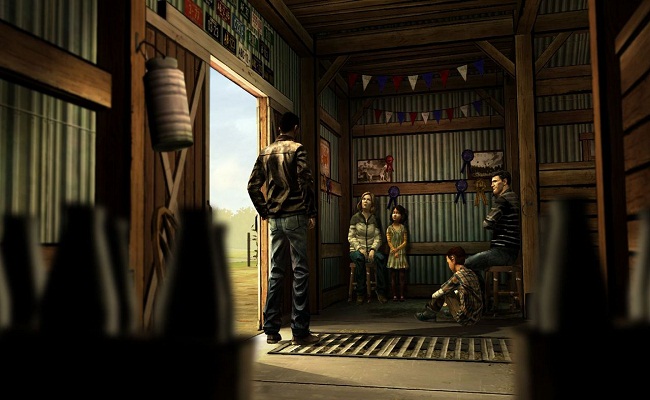The first episode of Telltale’sThe Walking Dead was a gamble that paid off. It mixed survival horror with the point and click adventure format to prove that zombies could be made scary again. But Episode 2 shows that the undead aren’t the worst danger of a zombie holocaust. No, in Starved For Help, players discover that hunger is a fearsome foe.
This new episode doesn’t tinker with the general gameplay. It’s essentially a point and click game that switches to a sort of minigame for combat. When enemies attack, players have to quickly aim whatever weapon they have with a shaky set of crosshairs and click on the target area of their opponent.
Most of the time, players won’t be fighting at all and will get through the story with light puzzle solving and lots of conversation. Talking to NPC’s is kept exciting by giving players a limited amount of time pick their response, and making it clear that saying the wrong thing can affect the story in both the short term and the long run.
It picks up a few months after Episode 1. The protagonist, Lee and his band of survivors have managed to find refuge from the zombie horde, but months spent holed up in an abandoned motel have left them low on supplies. This remains true to the basic idea of The Walking Dead franchise; how do people survive a zombie apocalypse in the long term?
The answer is: By making hard choices, then dealing with the consequences of your frequent bad decisions. Right from the start of Starved For Help it seems that the heartless developers at Telltale have put Lee and the Player is a series of no-win situations. No matter what Lee does, people are going to die.
Horribly.
This is a design choice carried over from the first game, in that Lee was put in situations where he had choose which of his companions would live or die. The fallout of thee options has been carried over into the second episode, and now that the second part (Of five) is here, gamers can get a better handle on just how big an impact these choices make.
As hoped, they do have a notable effect on how the game progresses. Lee will have different companions in the second episode depending on who survived the first, and his relationships with his fellow survivors change too. If he became friends with someone last time around, this episode remembers that. If he became enemies with anyone in the group… they remember that too.
A central point of the story is Lee becoming the guardian of a young girl named Clementine. He is also her moral compass and this forces players to think hard about their actions.
With The Walking Dead, gamers aren’t trying to do the right thing because that’s what some game designer decided is “Right”. In this game, players have to look into Clementine’s eyes and justify their actions.
The fantasy of being a badass zombie-killer fades away when there’s a child looking to you as a role model. Even if the child is just a collection of AI scripts and animated pixels.
This emotional intensity hits a boiling point in the finale of the game when Lee has the chance to take vengeance on the truly vile enemies he meets. Players have the choice to do what’s “Good” or to do what feels good. Choose to behave mercilessly and Clementine will remember. Not just in this episode but for the rest of the game.
There’s a plot twist to this episode, and it shouldn’t be hard for players to guess what’s coming (In fact clever gamers might figure it out based on the title alone). However when the reveal comes, it’s done in a way that is still gripping even though it isn’t surprising.
As with Telltale’s episodic games, each episode is short, and Starved For Help will only take about three hours to play through. However, with the multiple story paths plus choices carried over from the first episode, it has extensive replay value.
The Walking Dead Episode 2: Starved For Help is a step up from the already great first episode. Players who were on the fence about the series can consider it a safe bet based on this second installment. It is out now for PC, Mac, Xbox Live and Playstation Network.

0 Comments